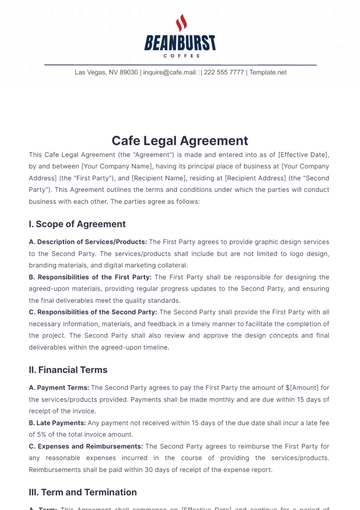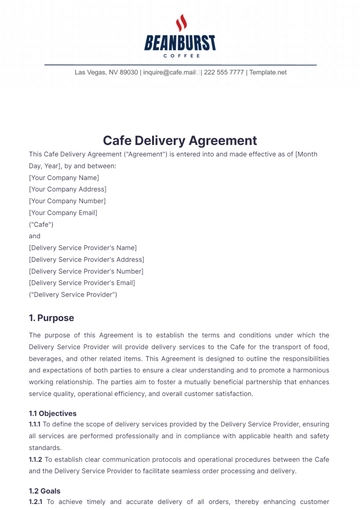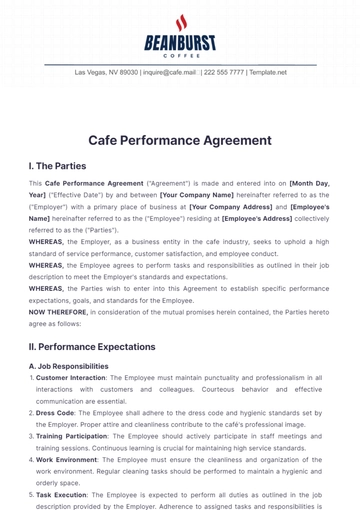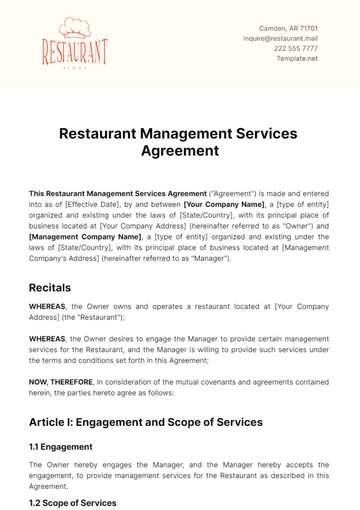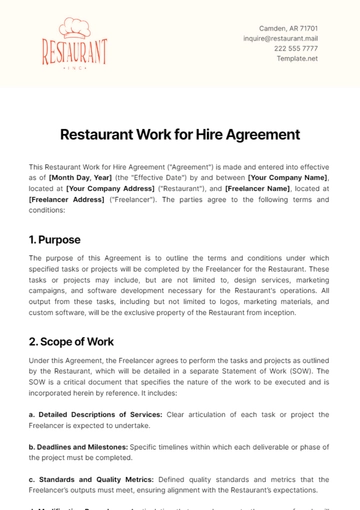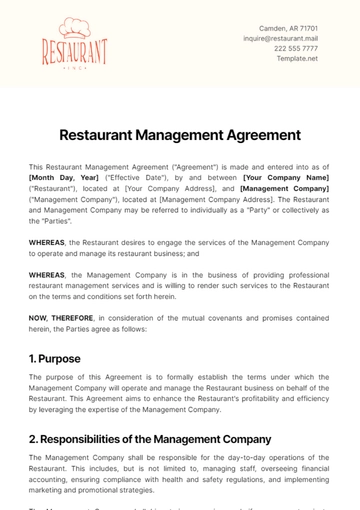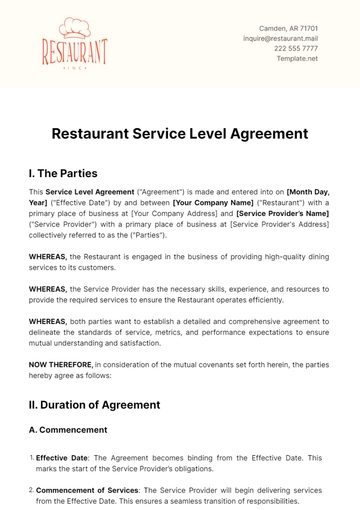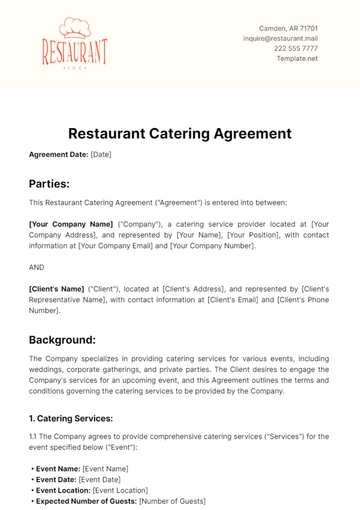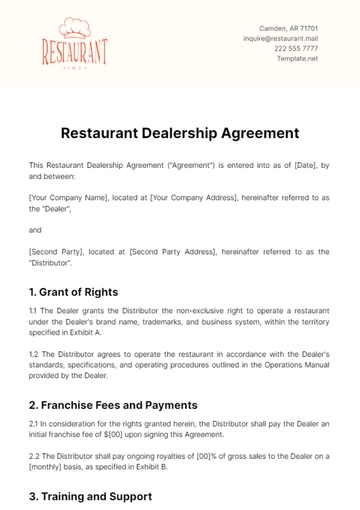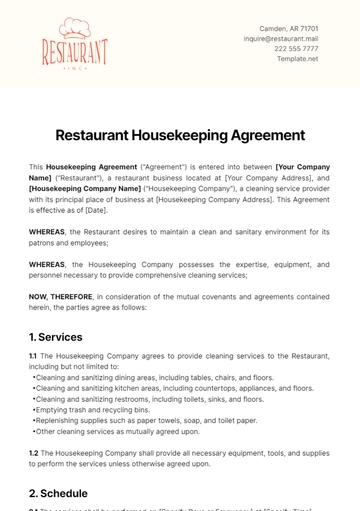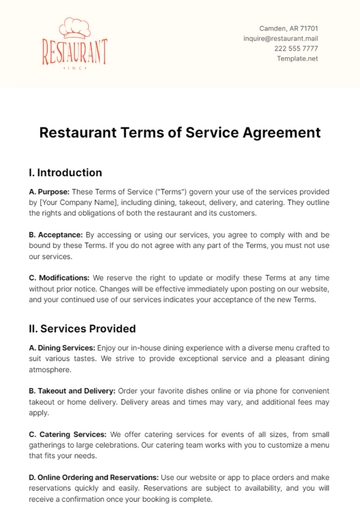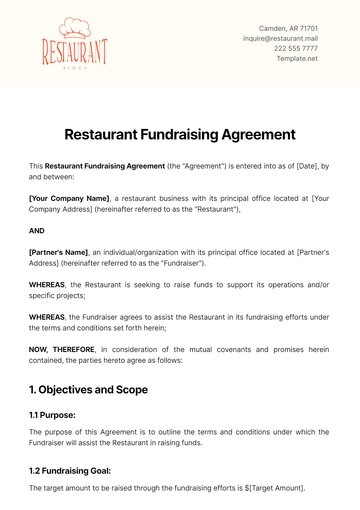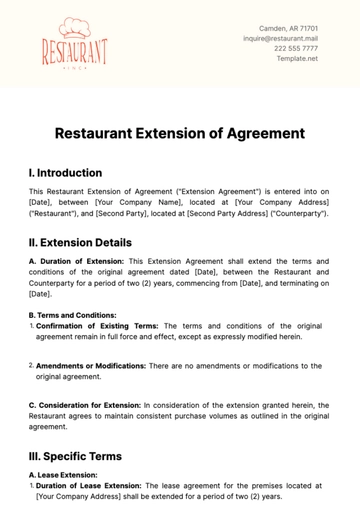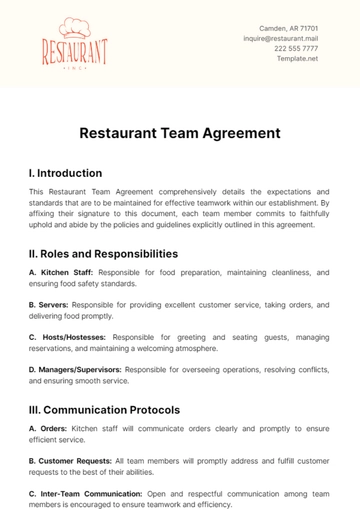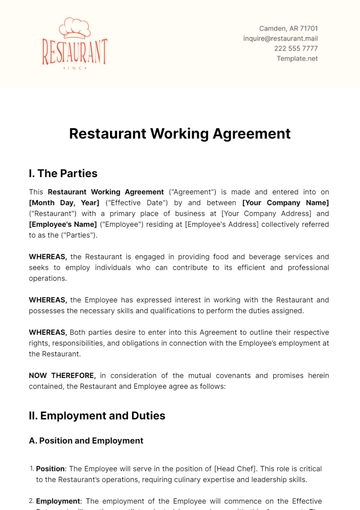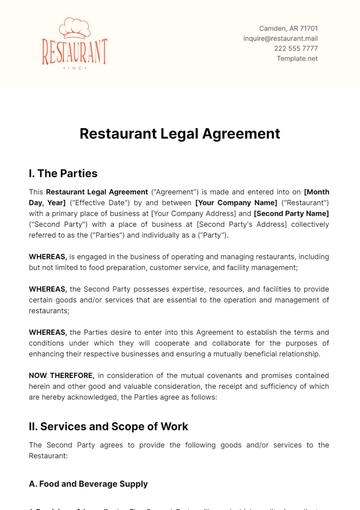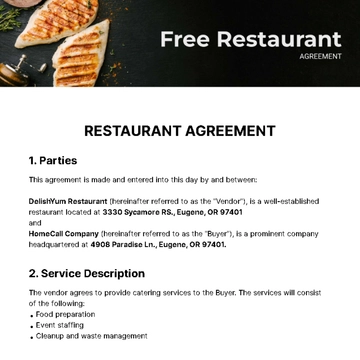Free Cafe Performance Agreement
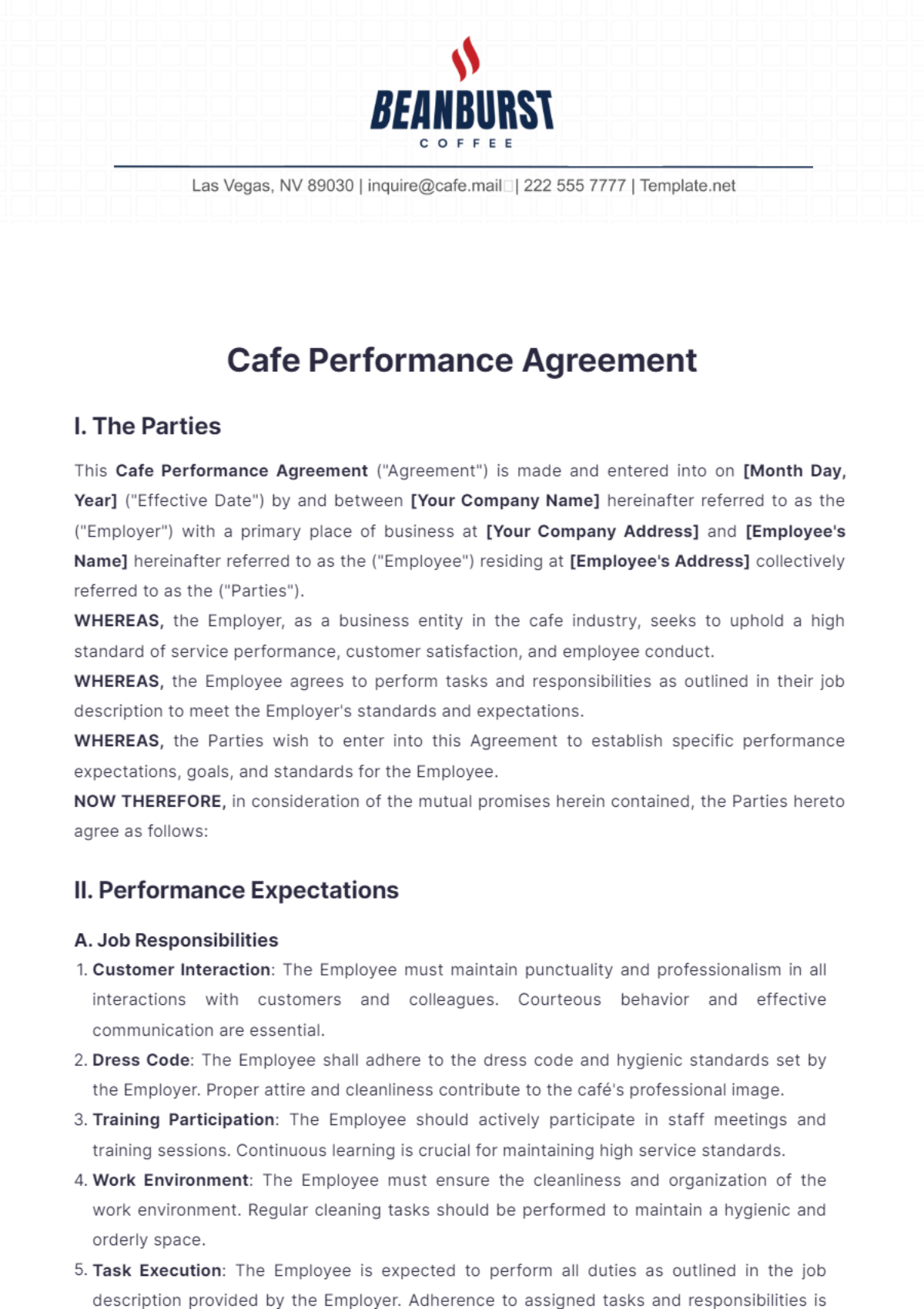
I. The Parties
This Cafe Performance Agreement ("Agreement") is made and entered into on [Month Day, Year] ("Effective Date") by and between [Your Company Name] hereinafter referred to as the ("Employer") with a primary place of business at [Your Company Address] and [Employee's Name] hereinafter referred to as the ("Employee") residing at [Employee's Address] collectively referred to as the ("Parties").
WHEREAS, the Employer, as a business entity in the cafe industry, seeks to uphold a high standard of service performance, customer satisfaction, and employee conduct.
WHEREAS, the Employee agrees to perform tasks and responsibilities as outlined in their job description to meet the Employer's standards and expectations.
WHEREAS, the Parties wish to enter into this Agreement to establish specific performance expectations, goals, and standards for the Employee.
NOW THEREFORE, in consideration of the mutual promises herein contained, the Parties hereto agree as follows:
II. Performance Expectations
A. Job Responsibilities
Customer Interaction: The Employee must maintain punctuality and professionalism in all interactions with customers and colleagues. Courteous behavior and effective communication are essential.
Dress Code: The Employee shall adhere to the dress code and hygienic standards set by the Employer. Proper attire and cleanliness contribute to the café's professional image.
Training Participation: The Employee should actively participate in staff meetings and training sessions. Continuous learning is crucial for maintaining high service standards.
Work Environment: The Employee must ensure the cleanliness and organization of the work environment. Regular cleaning tasks should be performed to maintain a hygienic and orderly space.
Task Execution: The Employee is expected to perform all duties as outlined in the job description provided by the Employer. Adherence to assigned tasks and responsibilities is mandatory.
B. Customer Service Standards
Service Excellence: The Employee is to provide exceptional service to all customers to ensure their satisfaction. Friendly, prompt, and efficient service is paramount.
Complaint Handling: The Employee shall handle customer complaints and queries professionally and escalate issues when necessary. Effective resolution of complaints is critical for customer retention.
Product Knowledge: The Employee must be knowledgeable about the products offered and provide accurate information to customers. This includes familiarity with the menu and any promotions.
Sales Promotion: The Employee is expected to upsell and promote the cafe's specials and promotions. Encouraging additional purchases can enhance customer experience and increase sales.
III. Performance Evaluation
A. Evaluation Metrics
Punctuality and Attendance: The Employee's performance shall be evaluated based on punctuality, customer feedback, and adherence to responsibilities. Regular attendance is essential.
Sales Efficiency: The Employee's output in terms of sales and service efficiency will be assessed regularly. Meeting sales targets is a key performance indicator.
Team Contribution: The Employee's ability to work as part of a team and contribute positively to the work environment will be reviewed. Effective teamwork is crucial for café operations.
Professional Conduct: The Employee's conduct and professionalism in various situations will be considered. Maintaining a professional demeanor is important for the café’s reputation.
B. Evaluation Frequency
Quarterly Reviews: Performance evaluations will be conducted quarterly by the Employer or their designated representative. Regular reviews help monitor progress.
Written Reviews: The Employee will receive a written performance review document after each evaluation. Documentation provides a clear record of performance.
Goal Setting: The Employer and Employee will discuss the results of the performance evaluation and set goals for improvement if necessary. Goal setting fosters continuous improvement.
IV. Recognition and Rewards
A. Performance-Based Incentives
Monthly Bonuses: The Employee may receive bonuses based on exceptional performance exceeding expectations. Financial rewards can motivate high performance.
Additional Benefits: Incentives may include monetary bonuses, gift cards, and additional paid time off. Various rewards can cater to different motivational needs.
Customer Service Awards: The Employee could be awarded for excellent customer service through a recognition program. Public recognition boosts morale and encourages excellence.
B. Career Advancement
Promotion Opportunities: Opportunities for career advancement within the organization will be considered based on performance evaluations. Career growth is encouraged.
Eligibility for Promotion: The Employee may be eligible for promotion to a higher position contingent on consistently meeting performance standards. Promotions reward dedication and skill.
Training Programs: Education and training programs may be offered to the Employee to enhance skills and knowledge. Continuous learning opportunities support professional development.
V. Consequences of Non-Performance
A. Verbal and Written Warnings
Initial Warnings: Minor performance issues will initially be addressed through verbal warnings by the Employer. Immediate feedback helps correct minor issues.
Formal Warnings: Repeated or serious breaches of performance expectations may result in written warnings to the Employee. Documentation of warnings is essential.
Escalation: Continued non-performance after warnings may lead to further disciplinary actions. Escalation ensures that persistent issues are addressed.
B. Disciplinary Actions
Suspension or Duty Reduction: Failure to meet performance standards could result in suspension or reduction of duties. Temporary measures can provide an opportunity for improvement.
Termination: Severe cases of misconduct or continuous non-performance may lead to termination of employment. Termination is a last resort after other measures fail.
Documentation: The Employer will document all disciplinary actions taken and provide copies to the Employee. Proper documentation ensures transparency and fairness.
VI. Employee Conduct
A. Professional Behavior
Communication: The Employee must demonstrate professionalism in all communications and interactions within the workplace. Respectful and clear communication is essential.
Attitude: Employees are expected to maintain a positive and respectful attitude towards colleagues and customers. A positive attitude contributes to a pleasant work environment.
Conduct: Unprofessional behavior, including harassment or discrimination, will not be tolerated. Maintaining a safe and respectful workplace is crucial.
B. Compliance with Policies
Policy Adherence: The Employee must comply with all company policies and procedures as outlined in the employee handbook. Adherence to policies ensures consistent standards.
Attendance Policies: These policies include but are not limited to attendance, leave, and code of conduct policies. Reliable attendance is vital for operational efficiency.
Disciplinary Action: Failure to comply with company policies may result in disciplinary action as deemed appropriate by the Employer. Policies are enforced to maintain order and standards.
VII. Confidentiality
A. Customer Information
Non-Disclosure: The Employee shall not disclose any customer information obtained during the course of employment to third parties. Protecting customer privacy is essential.
Data Security: Any breach of confidentiality regarding customer information shall be considered a severe violation. Data security must be upheld at all times.
Information Handling: The Employee must ensure that customer data is securely handled and stored. Secure handling prevents unauthorized access.
B. Company Proprietary Information
Confidentiality Obligation: All information related to the cafe's operations, sales, and strategies is considered confidential. Maintaining confidentiality protects the café’s interests.
Prohibited Use: The Employee must not share or use this information for personal gain or outside purposes. Misuse of information is strictly prohibited.
Legal Consequences: Breaching this confidentiality may result in legal actions and termination of employment. Legal measures will be taken to protect the café.
VIII. Amendment and Termination
A. Amendment of Agreement
Written Amendments: This Agreement may be amended only by a written document signed by both Parties. Verbal changes are not enforceable.
Mutual Consent: Any changes to the performance expectations or goals must be mutually agreed upon. Both parties must consent to amendments.
Operational Changes: The Employer reserves the right to update the job responsibilities as necessary to reflect changes in business operations. Job roles may evolve with business needs.
B. Termination of Employment
Notice Requirement: Either Party may terminate this Agreement by providing a written notice of at least [14] days. Advance notice allows for proper transition.
Immediate Termination: Immediate termination may occur in cases of severe misconduct or breach of Agreement by the Employee. Serious violations require swift action.
Property Return: Upon termination, the Employee must return all company property and settle any outstanding dues. Returning property ensures the café’s resources are accounted for.
IX. Governing Law
A. Jurisdiction
Applicable Law: This Agreement shall be governed by and construed in accordance with the laws of [State Name]. State law provides the legal framework for the Agreement.
Legal Proceedings: Any legal proceedings arising from this Agreement shall be conducted in the jurisdiction where the café operates. Local jurisdiction ensures relevant legal considerations.
B. Dispute Resolution
Amicable Resolution: In the event of any disputes arising out of or relating to this Agreement, the Parties shall first attempt to resolve the matter amicably through mutual discussions. Open communication can often resolve conflicts.
Mediation: If the dispute cannot be resolved through discussions, the Parties agree to engage in mediation before initiating any formal legal proceedings. Mediation provides a structured yet informal dispute resolution process.
Arbitration: Should mediation fail, the dispute will be submitted to binding arbitration, with costs shared equally by the Parties. Arbitration provides a final and legally binding resolution.
X. Miscellaneous
A. Entire Agreement
Complete Understanding: This Agreement constitutes the entire understanding between the Parties concerning the subject matter hereof and supersedes all prior or contemporaneous agreements, representations, or negotiations, whether written or oral. This ensures clarity and comprehensiveness.
Binding Agreement: The terms of this Agreement are binding on both Parties and their successors and assigns. Both parties are legally obligated to adhere to the Agreement.
B. Severability
Independent Provisions: If any provision of this Agreement is found to be illegal or unenforceable, the remaining provisions of this Agreement shall remain in full force and effect. Severability ensures the Agreement’s continuity.
Modification of Invalid Provisions: The Parties agree to modify any invalid provisions to reflect their original intent as closely as possible. Modifications ensure compliance with the law.
XI. Signatures
IN WITNESS WHEREOF, the Parties have executed this Agreement as of the Effective Date.
Employer

[Authorized Representative Name]
[Your Company Name]
Date: [Month Day, Year]
Employee

[Employee's Name]
Date: [Month Day, Year]
- 100% Customizable, free editor
- Access 1 Million+ Templates, photo’s & graphics
- Download or share as a template
- Click and replace photos, graphics, text, backgrounds
- Resize, crop, AI write & more
- Access advanced editor
Establish performance expectations with our Cafe Performance Agreement Template! Available on Template.net, this customizable template provides a structured format for setting performance goals and expectations. Its editable nature allows for easy customization to suit different roles. Use the advanced AI Editor Tool for streamlined and precise editing! Get started now!
You may also like
- Lease Agreement
- Non Compete Agreement
- Rental Agreement
- Prenuptial Agreement
- Non Disclosure Agreement
- Operating Agreement
- Hold Harmless Agreement
- LLC Operating Agreement
- Arbitration Agreement
- Purchase Agreement
- Residential Lease Agreement
- Executive Agreement
- Confidentiality Agreement
- Contractor Agreement
- Partnership Agreement
- Postnuptial Agreement
- Collective Bargaining Agreement
- Loan Agreement
- Roommate Agreement
- Commercial Lease Agreement
- Separation Agreement
- Cohabitation Agreement
- Room Rental Agreement
- Child Custody Agreement
- Employee Agreement
- License Agreements
- Settlement Agreement
- Joint Venture Agreement
- Indemnity Agreement
- Subordination Agreement
- Sales Agreement
- Agreements Between Two Parties
- Business Agreement
- Real Estate Agreement
- HR Agreement
- Service Agreement
- Property Agreement
- Agreement Letter
- Restaurant Agreement
- Construction Agreement
- Finance Agreement
- Marketing Agreement
- Payment Agreement
- Investment Agreement
- Management Agreement
- Nonprofit Agreement
- Software Agreement
- Startup Agreement
- Agency Agreement
- Copyright Agreement
- Collaboration Agreement
- Reseller Agreement
- Car Rental Agreement
- Cleaning Services Agreement
- Consultant Agreement
- Deed Agreement
- Car Agreement
- Equipment Agreement
- Shares Agreement
- Data Sharing Agreement
- Advertising Agreement
- School Agreement
- Franchise Agreement
- Event Agreement
- Travel Agency Agreement
- Vehicle Agreement
- Board Resolution Agreement
- Land Agreement
- Binding Agreement
- Tenancy Agreement
- Exclusive Agreement
- Development Agreement
- Assignment Agreement
- Design Agreement
- Equity Agreement
- Mortgage Agreement
- Purchase and Sale Agreement
- Shareholder Agreement
- Vendor Agreement
- Royalty Agreement
- Vehicle Lease Agreement
- Hotel Agreement
- Tenant Agreement
- Artist Agreement
- Commission Agreement
- Consignment Agreement
- Debt Agreement
- Recruitment Agreement
- Training Agreement
- Transfer Agreement
- Apprenticeship Agreement
- IT and Software Agreement
- Referral Agreement
- Resolution Agreement
- Waiver Agreement
- Consent Agreement
- Partner Agreement
- Social Media Agreement
- Customer Agreement
- Credit Agreement
- Supply Agreement
- Agent Agreement
- Brand Agreement
- Law Firm Agreement
- Maintenance Agreement
- Mutual Agreement
- Retail Agreement
- Deposit Agreement
- Land Purchase Agreement
- Nursing Home Agreement
- Supplier Agreement
- Buy Sell Agreement
- Child Support Agreement
- Landlord Agreement
- Payment Plan Agreement
- Release Agreement
- Research Agreement
- Sponsorship Agreement
- Buyout Agreement
- Equipment Rental Agreement
- Farm Agreement
- Manufacturing Agreement
- Strategic Agreement
- Termination of Lease Agreement
- Compliance Agreement
- Family Agreement
- Interior Design Agreement
- Ownership Agreement
- Residential Lease Agreement
- Retainer Agreement
- Trade Agreement
- University Agreement
- Broker Agreement
- Dissolution Agreement
- Funding Agreement
- Hosting Agreement
- Investor Agreement
- Memorandum of Agreement
- Advisory Agreement
- Affiliate Agreement
- Freelancer Agreement
- Grant Agreement
- Master Service Agreement
- Parking Agreement
- Subscription Agreement
- Trust Agreement
- Cancellation Agreement
- Horse Agreement
- Influencer Agreement
- Membership Agreement
- Vacation Rental Agreement
- Wholesale Agreement
- Author Agreement
- Distributor Agreement
- Exchange Agreement
- Food Agreement
- Guarantee Agreement
- Installment Agreement
- Internship Agreement
- Music Agreement
- Severance Agreement
- Software Development Agreement
- Storage Agreement
- Facility Agreement
- Intercompany Agreement
- Lending Agreement
- Lodger Agreement
- Outsourcing Services Agreement
- Usage Agreement
- Assurance Agreement
- Photography Agreement
- Profit Sharing Agreement
- Relationship Agreement
- Rent To Own Agreement
- Repayment Agreement
- Volunteer Agreement
- Co Parenting Agreement
- HVAC Agreement
- Lawn Care Agreement
- SAAS Agreement
- Work from Home Agreement
- Coaching Agreement
- Protection Agreement
- Security Agreement
- Repair Agreement
- Agreements License
